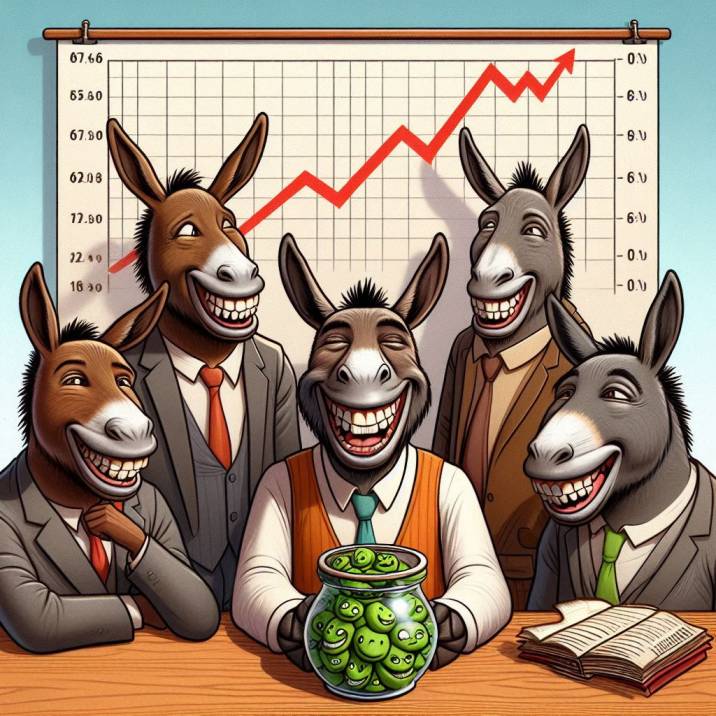
When Mathematics Meets Madness: The Hidden Patterns of Market Psychology
Oct 24, 2024
The Paradox of Certainty
In 73 BCE, Rome’s wealthiest man, Marcus Licinius Crassus, bought burning buildings at bargain prices while their owners watched in despair. Today, Renaissance Technologies’ James Simons employs quantum physics to decode market patterns that most traders can’t comprehend. What links these two investors, separated by two millennia? They understood that maximum profit lies not in the obvious but in the spaces between certainty and chaos.
Consider this: 89% of traders who achieve extraordinary gains in their first year lose everything by year five. The pattern repeats across centuries, cultures, and market conditions. Why? Because success plants the seeds of its destruction – a phenomenon that mathematician-philosopher Blaise Pascal called “the heart’s reasons that reason knows nothing of.”
As markets swing between euphoria and despair, we witness the same psychological patterns Gustave Le Bon documented in his groundbreaking studies of crowd behaviour. When everyone sees the same opportunity, it ceases to be an opportunity.
The Mathematics of Mass Delusion
What if everything you’ve learned about market timing is precisely wrong? While most investors chase momentum indicators and moving averages, Renaissance Technologies’ Simons discovered that the real patterns lie in human behaviour. His quantum physics background revealed something startling: markets don’t follow the clean lines of technical analysis – they follow the chaotic patterns of human psychology.
Crassus understood this 2,000 years before modern behavioural finance. By creating his own fire brigade in ancient Rome, he exploited not just burning buildings but also the predictable panic of their owners. He knew that in moments of crisis, humans don’t act rationally—they react viscerally.
Le Bon’s research shows why even sophisticated investors fall prey to mass movements. When submerged in the crowd, the individual mind loses its capacity for critical judgment. This explains why market bubbles form, not despite sophisticated participants but because of them.
The Madness of Crowds, Tamed
Gustave Le Bon, the renowned psychologist, observed that “the opinions, emotions, and behaviours of individuals in a group tend to converge.” This phenomenon, known as groupthink, can lead to disastrous decisions, especially in investing. Le Bon’s work helps explain why even the most rational individuals can get swept up in market manias.
But how do we harness this understanding for better investment decisions? Enter James Simons, the mathematician-turned-investor. Simons recognized that markets are not just about numbers but also human behaviour. By applying advanced mathematical models, he aimed to predict not just market movements but also the collective behaviour of investors.
Simons’ approach was akin to deciphering a complex code that few could understand. His fund, Renaissance Technologies, became known for its secrecy and stellar returns. While others relied on traditional indicators, Simons treated the market like a complex, chaotic system, much like the behaviour of particles in quantum physics.
Ancient investor Marcus Licinius Crassus also understood the power of exploiting market extremes. He once advised, “Buy only when blood is running in the streets.” Crassus recognized that the best opportunities arise when fear grips the market, causing investors to act irrationally and sell at any price.
Blaise Pascal, the 17th-century philosopher, surprisingly bridged these worlds. His work on probability theory laid the foundation for modern statistics and decision-making under uncertainty. Pascal’s Wager, a philosophical argument, suggests that even without certainty, we must act as if God exists because the potential gain is infinite. Applied to investing, this indicates that we should make decisions assuming the best possible outcome, even if it contradicts conventional wisdom.
The Art of Contrarian Strategy
So, how do we apply these insights to our investment strategies? By embracing contrarianism, we can capitalize on market extremes. Consider the recent cryptocurrency crash, which saw Bitcoin lose over 70% of its value. While many panicked, a contrarian approach would suggest buying when fear is at its peak.
Le Bon’s work on crowd behavior explains why such panics occur. He wrote, “The most logical plans, and even the simplest, become utterly incomprehensible to the crowd.” Thus, in moments of extreme fear or greed, rational decision-making breaks down, and the crowd behaves illogically.
Simons’ approach to investing offers a practical strategy. His fund uses data-driven models to identify patterns and make decisions. By analysing historical data, they can identify and exploit market turning points. For instance, while others were selling during the 2008 financial crisis, Renaissance Technologies was buying distressed assets, profiting from the eventual recovery.
Crassus, too, provides a timeless lesson in contrarianism. He once bought a large quantity of discounted slaves during a panic and later sold them at a substantial profit. This ancient example illustrates the power of going against the herd and buying when prices are depressed due to fear.
Pascal’s philosophy adds a nuanced twist. He wrote, “The heart has its reasons, which reason knows nothing of.” In investing, we must acknowledge the emotional component of decision-making. Even the most rational investors can be swayed by fear or greed. By recognizing and managing these emotions, we can make more informed choices.
Uncertainty, the Ultimate Catalyst
Uncertainty is the lifeblood of markets, and the greatest investors are those who can embrace it. Simons, Crassus, and Pascal, each in their way, understood that uncertainty creates opportunities. By accepting and analyzing uncertainty, they made extraordinary gains.
Simons’ approach to uncertainty was to embrace complexity. He once said, “If you can model a system with some precision, you can make predictions.” His models aimed to predict market behaviour, knowing that uncertainty creates the potential for significant gains.
Crassus, on the other hand, thrived in the chaos of the Roman Republic. He understood that uncertainty creates openings for those bold enough to act. His famous quote, “In a fire, you buy when the flames are highest,” captures the essence of contrarian investing.
Pascal’s philosophical wager provides a framework for decision-making under uncertainty. By acknowledging the limits of human knowledge, he encourages us to act decisively, even in the face of doubt. Investing means making bold moves when others hesitate and trusting in our ability to navigate uncertainty.
Together, these three figures teach us that uncertainty is not an obstacle but an opportunity. By embracing the unknown, we can make extraordinary gains, whether through sophisticated models, contrarian strategies, or philosophical insight.
When Quantum Physics Meets Ancient Wisdom
Pascal’s famous wager about infinity finds an unexpected echo in Simons’ quantum approach to markets. Both men understood that absolute certainty is impossible, but probability offers a path forward. The Renaissance Technologies founder’s algorithms don’t predict the future – they calculate probabilities across thousands of simultaneous scenarios, much like quantum mechanics describes multiple possible states of reality.
This multidimensional thinking would have fascinated Le Bon, who observed that crowds create their reality. When markets panic, they reflect fear and amplify it, creating feedback loops that generate self-fulfilling prophecies. Yet within these loops lie predictable patterns, invisible to the naked eye but clear to those who understand mass psychology’s mathematical signatures.
Consider how Crassus built his fortune: not by predicting fires, but by creating a system that profited from inevitable chaos. Today’s most successful hedge funds follow a similar principle, building mathematical models that profit not from prediction but from probability. They understand that markets, like quantum particles, exist in multiple states until observed.
The real secret isn’t timing—it’s positioning. Just as Crassus strategically positioned his fire brigade throughout Rome, modern quantitative traders position themselves across multiple market scenarios. They don’t try to predict which scenario will unfold; they profit from the uncertainty.
Beyond the Binary
What if the greatest market opportunities arise not from being right but from understanding how others are wrong? Pascal’s mathematical mind would appreciate this paradox: the more certain the crowd becomes, the more likely they are to be mistaken. This explains why market tops often coincide with peak confidence and market bottoms with maximum despair.
The wisdom of these four masters—Pascal’s probability theory, Crassus’s strategic positioning, Le Bon’s crowd psychology, and Simons’ quantum approach—converges on a singular truth: successful investing isn’t about predicting the future. It’s about understanding the present moment’s possibilities and positioning yourself to profit regardless of how reality manifests.
Conclusion: The Infinite Game
As we conclude, consider this: What if markets aren’t puzzles to be solved but patterns to be understood? The greatest investors in history succeeded not because they knew more but because they understood the limitations of knowledge itself. In Pascal’s words, “All of humanity’s problems stem from man’s inability to sit quietly in a room alone.” Perhaps the same applies to investing – the ability to remain calm amid chaos, to embrace uncertainty rather than fight it, marks the difference between temporary success and lasting wealth.
The next time, markets swing wildly. Pundits proclaim certainty; remember: the world’s wisest investors didn’t try to predict the future. They built systems that profited from humanity’s predictable unpredictability. Ultimately, the market’s greatest secret may be this: true mastery comes not from conquering uncertainty but from dancing with it.














